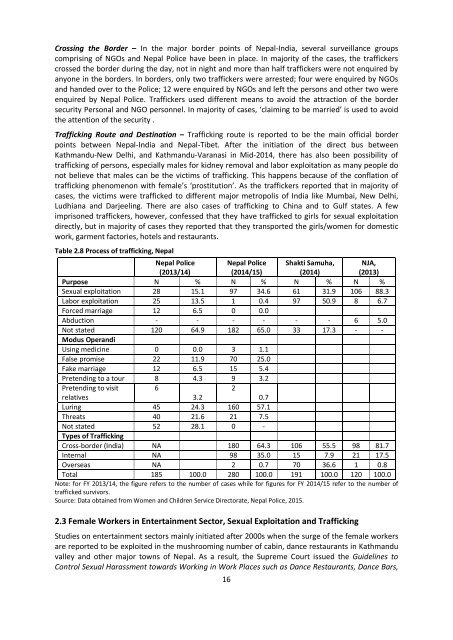TRAFFICKING IN PERSONS
1Spfyta
1Spfyta
Create successful ePaper yourself
Turn your PDF publications into a flip-book with our unique Google optimized e-Paper software.
These all studies establish the fact that female workers in the entertainment sectors are<br />
economically subjugated, and are vulnerable of sexual abuse, exploitation and trafficking. These<br />
entertainment sectors have become destination places for the village girls as well as source areas for<br />
the trafficking to abroad, mainly to Gulf States. Some NGOs such as Saathi, Bishwas Nepal,<br />
WOFOWON, Chhori and Change Nepal are engaged with support from the Asia Foundation, TDH,<br />
Geneva Global, and Danish Embassies to promote and protect the rights of female workers in the<br />
entertainment sectors. Despite this, there is lack of consolidated data on interventions and the<br />
number female workers engaged in the various forms of entertainment sectors.<br />
A workshop was organized by Shakti Samuha among female workers in entertainment sectors in<br />
November 18 and 19, 2014 in Budol, Kavre to understand the current situation of workers in<br />
entertainment sectors. Box 2.1 summarizes the key findings emerged from the workshop.<br />
Box 2.1 Current situation of female workers in entertainment sector<br />
• Increase in visit by the agents to restaurants and Dohori dance bars to lure girls/women<br />
going for abroad by giving false promises of good employment opportunity. Agents provide<br />
a number of promises to lure the female workers like promises of building a house, buying<br />
land, and paying to parents up to Rs. 200,000 to 300,000.<br />
• Many female workers who went to abroad have not been paid. Many participants reported<br />
that the promised work did not match with the offered work. For example, workers are<br />
offered work in beauty parlors but are involved in massage parlors.<br />
• The employers pay up to Rs. 15,000 monthly for those who have good skills in dancing and<br />
singing. Workers are either paid only tips or salary. If they are paid tips, they are not paid<br />
salary; if they are paid salary, they are not paid tips.<br />
• Agents often take pictures of workers and did not return it. This may lead to misuse of<br />
photos.<br />
• It is estimated that 90 percent of the restaurants in Goa, India have Nepali girls working as<br />
dance girls or singers and there are more than 150 girls/women in jail in Hong Kong and<br />
Dubai.<br />
• One participant reported that she was forced to go to Kuwait even by making the fake<br />
passport but she resisted it and another reported that she was offered to marry to a Korean<br />
man, but she declined it. Another participant reported that she is convinced to go to Korea<br />
in marriage visa.<br />
• The participants heard that in Samakhusi, Kathmandu, a Marriage Bureau is working to<br />
provide services for marriage visa.<br />
• One of the participants reported that one of participant’s relative was transported to<br />
Singapore and she was living in miserable condition.<br />
From the field visit of Chhori and Women’s Forum for Women in Gongabu area – the long route bus<br />
park area of Kathmandu valley, it is found that cabin restaurants in this area are replaced in to Khaja<br />
Ghar (literally, it is a small shed where cheap food, alcohol and meat is served). Before the<br />
earthquake of April 25, 2015, there were 17 cabin restaurants and 18 duet song (dohori) restaurants<br />
but now there are only 8 cabin restaurants and a few duet song (dohori) restaurants after the<br />
earthquake.<br />
Women and Children Office of Kathmandu has taken initiatives to make monitoring visits by<br />
involving the members of Monitoring Action Committee. Five monitoring visits were conducted<br />
during the year of 2014 and 2015. Finding of the monitoring visit was also shared in the District<br />
Administration Office, Kathmandu in March 2015. Further, Operating Procedure for the<br />
implementation of the Supreme Court Guideline has been finalized by the Monitoring Action<br />
Committee Kathmandu and sent to the Ministry of Home Affairs for final approval.<br />
18


